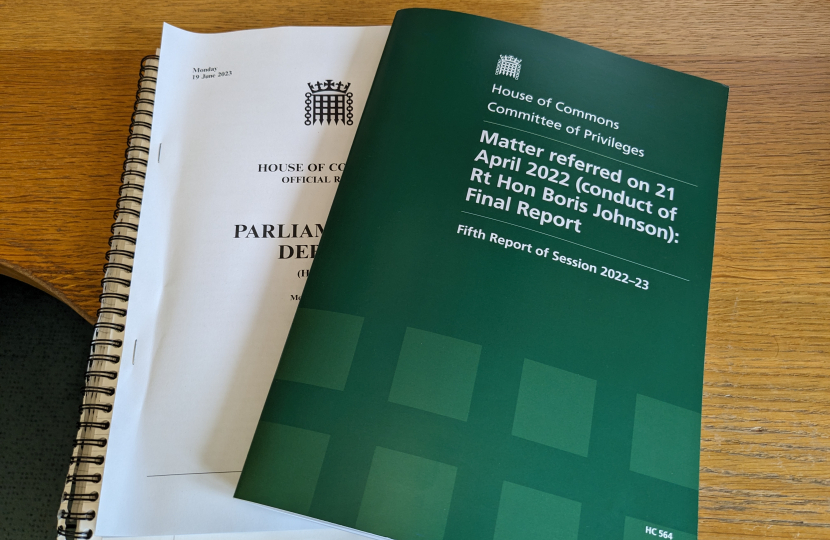
Understandably, in the run-up to yesterday’s important debate on the Committee of Privileges’ report on the conduct of the former Prime Minister, Boris Johnson, a number of residents emailed me to make their thoughts known on what I appreciate is a matter that continues to generate strong views. My approach to this issue has been clear and consistent throughout: simply put, to follow the evidence.
That unacceptable events took place in No10 Downing Street, which broke the rules and flew in the face of the sacrifices many of us were making at the time, is a matter of fact and not disputed. I have made no secret of my anger and disappointment at what took place and had the opportunity to question Mr Johnson at some length during his appearance before the Liaison Committee last July:
https://www.facebook.com/watch/?v=1223058891844316
These events were not themselves the focus of the Privileges Committee’s inquiry, which instead looked at the question as to whether Boris Johnson knowingly and deliberately misled Parliament in his explanations of these gatherings.
On 21st April 2022, the House of Commons referred this matter to the Committee of Privileges. Every Member of Parliament supported the setting up of that inquiry, including Mr Johnson, and, it is worth stressing, unanimously endorsed the membership of the Committee (made up of four Conservative and three Opposition MPs to reflect the political balance of the House of Commons). After considering thousands of pages of evidence and holding over thirty meetings, including a public hearing with Mr Johnson in March, the Committee published its findings last week. You can find the full report here.
The evidence they received, the conclusions they reached, and the rationale behind the sanction they recommended are set out clearly and in detail in their report. Regardless of whether you agree with each and every one of the Committee’s findings, we, as Members of Parliament, tasked the Committee to carry out this task on our behalf. It is no good to subsequently rubbish its conclusions, or, worse, seek to undermine the credibility of its members, simply because you do not like the outcome. Indeed, despite my political differences with members of the Committee, including those in my own Party, I have every confidence in their integrity. This inquiry was rigorously and diligently undertaken, and as a matter of good principle and process, and to help restore trust in Parliament, it was vital that we supported its recommendations. That is why I did not hesitate to vote in favour of them last night.
Misleading the House is, quite rightly, taken incredibly seriously in Parliament. It undermines trust, hinders effective scrutiny, and is an anathema to good governance. Our whole parliamentary system is based on the premise that, while we may vociferously disagree with one another personally and on the merits of our parties’ respective policies, we do not question the honesty, integrity or motivations of our political opponents, and that to the best our ability we ensure that we are honest in the statements that we make in Parliament. When someone transgresses that fundamental rule through falsehoods or deliberate misrepresentation, and, in doing so, breaks that trust, it is right that their peers censure them, irrespective of friendships or political allegiances, and no matter their seniority or rank.
I set out my thoughts further during this interview with Times Radio last weekend:
https://twitter.com/TimesRadio/status/1670097492095160320
I hope the above explains my thinking clearly.




